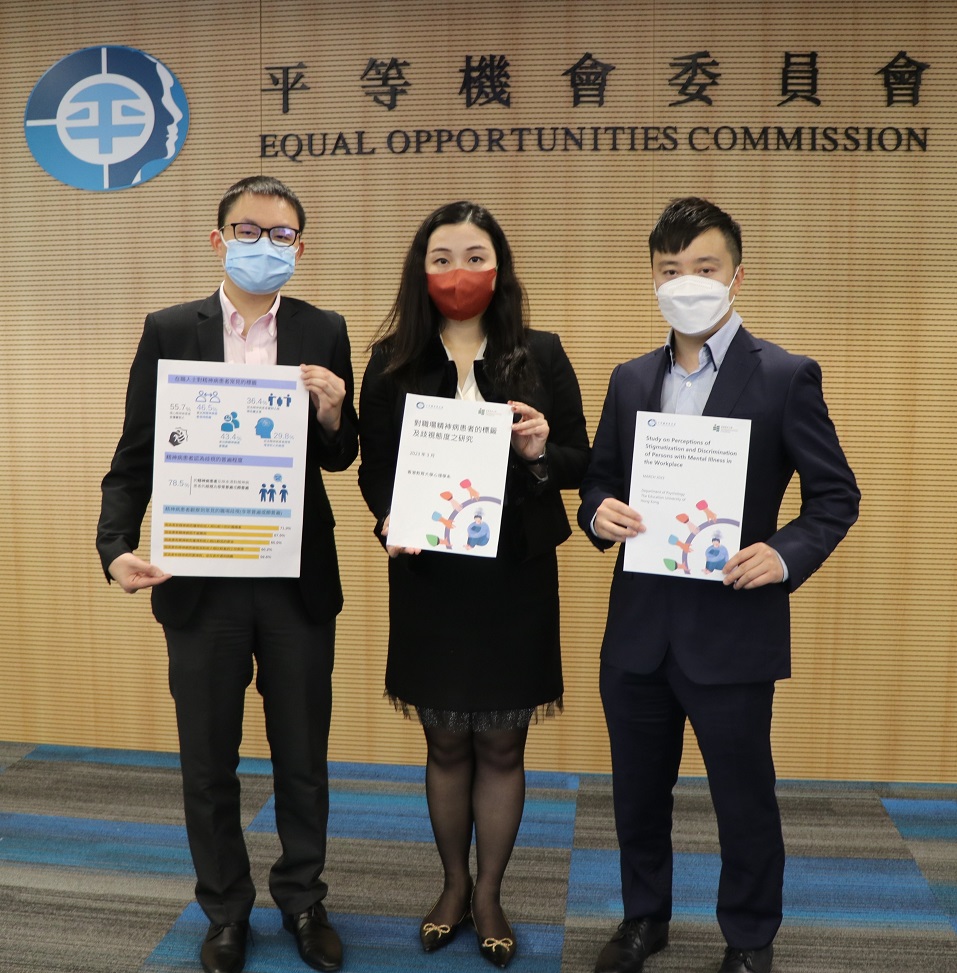
Persons with mental illness struggle with “prevalent” discrimination in the workplace
A majority of employed individuals and people with mental illness (PMIs) surveyed perceive the discrimination against PMIs in Hong Kong as “very or quite prevalent”, according to the latest EOC study on perceptions of stigmatisation and discrimination of PMIs in the workplace released on 28 February 2023.
Commissioned to the Department of Psychology of The Education University of Hong Kong, the main objectives of the EOC’s study were to evaluate the awareness and understanding of mental health among employers, supervisors and employees in Hong Kong, and study the prevalence of discrimination against PMIs in the workplace. Data was collected from 593 employed persons and 265 PMIs, while in-depth interviews were conducted with 50 employers and supervisors in managerial positions under the study. Some key findings are as follows:
- About 80% of employed persons (81.7%) and PMIs (78.5%) considered that the discrimination against PMIs in Hong Kong is very prevalent or quite prevalent;
- Around 70% of the respondents (both employed persons and PMIs) observed PMIs as “having fewer opportunities for promotion” and“not hired because of mental illness”;
- Majority of employed persons reported to show acceptance towards PMIs (89.4%), while one-fifth held stigmatised views against PMIs (19.8%);
- Over the past five years, some 45% of the PMIs reported that they experienced discrimination in at least one of the following scenarios: hiring, quitting/layoff, at work. But not many took action due to their concern over their employers’ views;
- Around one-fifth of PMIs (18.9%) encountered difficulties when applying for sick leave for seeking mental illness advice; and
- Only 12.5% of the PMIs reported that the company for which they were currently working or the last company they worked for has provided mental health support.
On the employers’ side, in-depth interviews showed that many employers and supervisors lack knowledge about their legal liability, what constituted disability discrimination under the Disability Discrimination Ordinance (DDO) and the procedure to handle complaints from PMIs on mental illness discrimination. There was also a lack of clear guidelines and policies for hiring and managing PMIs, especially for smaller companies.
Over two-thirds of the employed persons and PMIs considered that the Government should step up publicity for the DDO, while around 60% suggested that the Government should require companies to formulate equal opportunities policies.
In the light of the findings, the EOC recommends more public education to promote awareness of disability discrimination in Hong Kong. For instance, the Labour Department and Advisory Committee on Mental Health can work together with EOC to provide seminars and talks for both the management of businesses and their frontline staff. In addition, the Government should consider providing more resources and assistance to the EOC, the Labour Department and employers to proactively facilitate the development of discrimination-related policies and measures for supporting PMIs’ recovery in the workplace.
As for the employers, they are urged to offer reasonable work accommodation to employees as a mental health-friendly employment practice. Training may also be arranged for staff to debunk myths and promote mental health awareness.
For more details about the research, you may:

